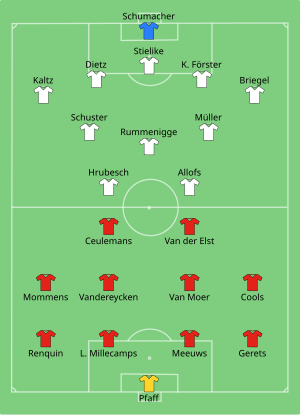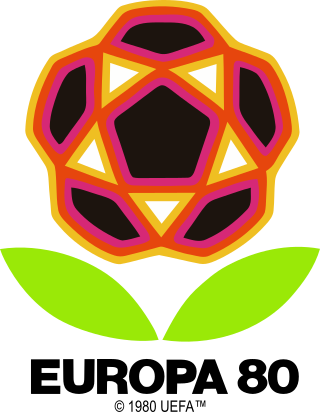Qualified teams
The top two placed teams from each of the two groups qualified for the knockout stage.
| Group | Winners (qualification for final) | Runners-up (qualification for third place play-off) |
|---|---|---|
| 1 | ||
| 2 |
The knockout stage of UEFA Euro 1980 was a single-elimination tournament involving the four teams that qualified from the group stage of the tournament. There were two matches: a third place play-off contested by the group runners-up, and the final to decide the champions, contested by the group winners. The knockout stage began with the third place play-off on 21 June and ended with the final on 22 June at the Stadio Olimpico in Rome. West Germany won the tournament with a 2–1 victory over Belgium. [1]
All times Central European Summer Time (UTC+2)
For the third place play-off, if the scores remained level after the end of the regular 90 minutes, the match would go straight to a penalty shoot-out (at least five penalties each, and more if necessary). If the final was undecided by the end of the regular 90 minutes, thirty minutes of extra time (two 15-minute halves) would be played. If scores were still level after 30 minutes of extra time, there would be a penalty shoot-out (at least five penalties each, and more if necessary) to determine the champion.
The top two placed teams from each of the two groups qualified for the knockout stage.
| Group | Winners (qualification for final) | Runners-up (qualification for third place play-off) |
|---|---|---|
| 1 | ||
| 2 |
| Final | ||
| 22 June – Rome | ||
| 1 | ||
| 2 | ||
| Third place play-off | ||
| 21 June – Naples | ||
| 1 (9) | ||
| 1 (8) | ||
Czechoslovakia [2] | Italy |
|  |
| |||||||||||||||||||||||||||||||||||||||||||||||||||||||||||||||||||||||||||||||||||||||||||||||||||||||
| Belgium | 1–2 | |
|---|---|---|
| Report |
|
Belgium | West Germany |
|  |
| ||||||||||||||||||||||||||||||||||||||||||||||||||||||||||||||||||||||||||||||||||||||||||||||||

The 1990 FIFA World Cup was the 14th FIFA World Cup, a quadrennial football tournament for men's senior national teams. It was held from 8 June to 8 July 1990 in Italy, the second country to host the event for a second time. Teams representing 116 national football associations entered and qualification began in April 1988. 22 teams qualified from this process, along with the host nation Italy and defending champions Argentina.

The 1984 UEFA European Football Championship final tournament was held in France from 12 to 27 June 1984. It was the seventh UEFA European Championship, a competition held every four years and endorsed by UEFA.

The 1980 UEFA European Football Championship finals tournament was held in Italy. This was the sixth UEFA European Championship, which is held every four years and endorsed by UEFA. It was the first European Championship to feature eight teams in the finals, which took place between 11 and 22 June 1980. West Germany won the final 2–1 against Belgium for their second title. This was the last European Championship with a third place play-off.

The 1968 UEFA European Football Championship final tournament was held in Italy. This was the third UEFA European Championship, an event held every four years and organised by UEFA. The final tournament took place between 5 and 10 June 1968.
The knockout stage of UEFA Euro 2004 was a single-elimination tournament involving the eight teams that qualified from the group stage of the tournament. There were three rounds of matches, with each round eliminating half of the teams entering that round, culminating in the final to decide the champions. The knockout stage began with the quarter-finals on 24 June and ended with the final on 4 July 2004 at the Estádio da Luz in Lisbon. Greece won the tournament with a 1–0 victory over the host nation Portugal.
The knockout stage of UEFA Euro 1992 was a single-elimination tournament involving the four teams that qualified from the group stage of the tournament. There were two rounds of matches: a semi-final stage leading to the final to decide the champions. The knockout stage began with the semi-finals on 21 June and ended with the final on 26 June 1992 at the Ullevi in Gothenburg. Denmark won the tournament with a 2–0 victory over Germany.
The knockout stage of UEFA Euro 1996 was a single-elimination tournament involving the eight teams that qualified from the group stage of the tournament. There were three rounds of matches, with each round eliminating half of the teams, culminating in two teams playing in the final to determine the winners of the tournament. The knockout stage began with the quarter-finals on 22 June and ended with the final on 30 June 1996 at Wembley Stadium in London. Germany won the tournament with a 2–1 victory over the Czech Republic achieved by a golden goal during extra time.

The UEFA Euro 1980 Final was the final match of UEFA Euro 1980, the sixth UEFA European Football Championship, UEFA's top football competition for national teams. The match was played at Stadio Olimpico in Rome, Italy, on 22 June 1980 and was contested by Belgium and West Germany. En route to the final, Belgium finished top of UEFA Euro 1980 qualifying Group 2 before qualifying for the final as winners of UEFA Euro 1980 Group 2 which included Italy, England and Spain. West Germany, who had ended the previous European Championship as runners-up, won UEFA Euro 1980 qualifying Group 7 and went on to secure qualification for the final after finishing top of UEFA Euro 1980 Group 1 which included Greece, Czechoslovakia and the Netherlands.
The knockout stage of UEFA Euro 2000 started with the first quarter-final on 24 June and ended with the final on 2 July 2000.
The knockout stage of the 1990 FIFA World Cup was the second and final stage of the final tournament, following the group stage. It began on 23 June with the round of 16 matches, and ended on 8 July with the final held at the Stadio Olimpico in Rome, in which West Germany beat the defending champions Argentina 1–0 to claim their third World Cup.
The knockout stage of the 1995–96 UEFA Champions League began on 6 March 1996 and ended with the final at the Stadio Olimpico in Rome on 22 May 1996. The top two teams from each of the four groups in the group stage competed in the knockout stage. The quarter-finals were predetermined with pairings being Group A vs Group B and Group C vs. Group D. A group winner played the runners-up from the other group, with the group winner host the second leg. For the semi-final, the fixtures were also predetermined, with the ties containing the group winners of A and D playing each other, as well as those of groups B and C. The order of matches from the semifinals onward was decided by a draw.
Group 1 of UEFA Euro 1980 began on 11 June 1980, and ended on 17 June 1980. The pool was made up of holders Czechoslovakia, West Germany, Netherlands, and Greece.
The UEFA European Championship is one of the major competitive international football tournaments, first played in 1960. The finals stage of the tournament takes place every four years, with a qualifying competition beforehand. The sixteenth tournament was held across Europe in 2021.
The UEFA European Championship is the main football competition of the men's national football teams governed by UEFA. Held every four years since 1960, in the even-numbered year between World Cup tournaments, it was originally called the UEFA European Nations Cup, changing to the current name in 1968. Starting with the 1996 tournament, specific championships are often referred to in the form "Euro 2008" or whichever year is appropriate. Prior to entering the tournament, all teams other than the host nations compete in a qualifying process.
Italy have participated in ten UEFA European Championships, and reached the final on four occasions. They became champions as hosts in 1968, the first European Championship they qualified for, and finished as runners-up in 2000 and 2012, before winning their second continental championship at Euro 2020.
Ukraine have appeared in three UEFA European Championships – Euro 2012, Euro 2016, and Euro 2020, with an upcoming fourth appearance at Euro 2024. Before 1996, some of its players played for the Soviet Union national team and CIS national team – Oleksiy Mykhailychenko, Hennadiy Lytovchenko, Oleh Luzhnyi, Ivan Hetsko and others.
As Slovakia along with the Czech Republic is considered to be the successor team of Czechoslovakia by FIFA and UEFA, they have qualified for a UEFA European Championship six times; three as Czechoslovakia and three as an independent nation since the dissolution of Czechoslovakia and its national team in 1993, with their sixth appearance in 2024. As an independent nation, they directly qualified in 2016 after finishing second in their qualifying group. For the draw of the end stage that took place on 12 December 2015, they were seeded in Pot 3. As Czechoslovakia, they became European champions in 1976, with 8 Slovaks in starting 11. As Slovakia, their best finish was in the round of 16 at Euro 2016.
The knockout stage of UEFA Euro 1988 was a single-elimination tournament involving the four teams that qualified from the group stage of the tournament. There were two rounds of matches: a semi-final stage leading to the final to decide the champions. The knockout stage began with the semi-finals on 21 June and ended with the final on 25 June 1988 at the Olympiastadion in Munich. The Netherlands won the tournament with a 2–0 victory over the Soviet Union.
The knockout stage of UEFA Euro 1984 was a single-elimination tournament involving the four teams that qualified from the group stage of the tournament. There were two rounds of matches: a semi-final stage leading to the final to decide the champions. The knockout stage began with the semi-finals on 23 June and ended with the final on 27 June at the Parc des Princes in Paris. France won the tournament with a 2–0 victory over Spain.

The final tournament of UEFA Euro 1968 was a single-elimination tournament involving the four teams that qualified from the quarter-finals. There were two rounds of matches: a semi-final stage leading to the final to decide the champions. The final tournament began with the semi-finals on 5 June and ended with the final replay on 10 June at the Stadio Olimpico in Rome. Italy won the tournament with a 2–0 replay victory over Yugoslavia.